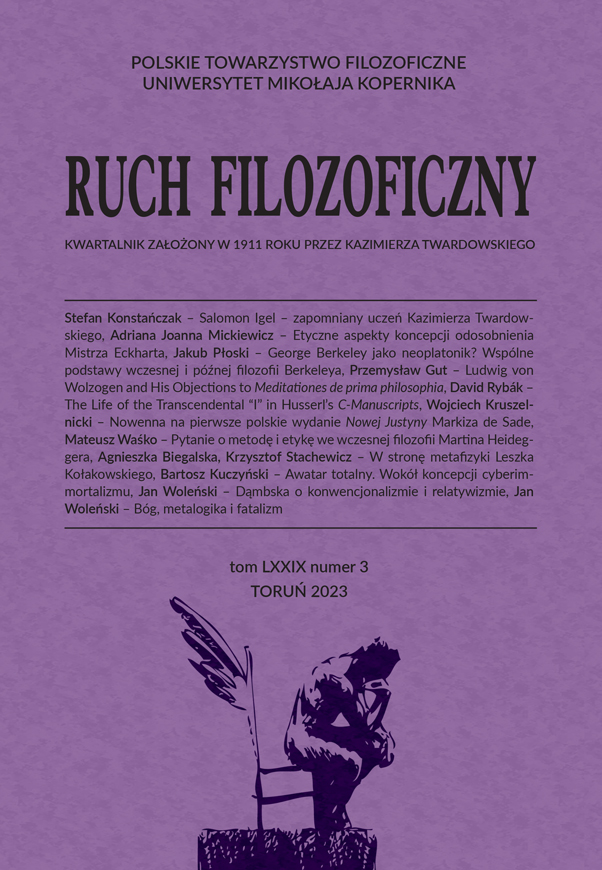The Life of the Transcendental I in Husserl’s C-Manuscripts
DOI:
https://doi.org/10.12775/RF.2023.023Keywords
primal life, striving, time, transcendental “I”Abstract
The following paper traces Husserl’s late time-analyses (concentrated especially in the so-called C-manuscripts) in the context of the problem of the life of the transcendental ego. We proceed from the constitutive stage of primal life (Urleben), in which the streaming living presence is constituted as lasting now (nunc stans). Then we trace further the structural connections of the constitution of the so-called first transcendence, that is, the transcendence of the immanent stream of consciousness, and the second transcendence, in which life is constituted as living-in-the-world (In-der-Welt-Leben). It turns out that the life of the transcendental I is of the character of a striving life (strebendes Leben) and that the first and second transcendence belong to it essentially.
References
Aristotle. 1952. Physics. In R. M. Hutchins (Ed.), R. P. Hardie and R. K. Gaye (Translate), The works of Aristotle volume 1, 257-355. Chicago, IL: William Benton.
Brough, John B. 2016. Some Reflections on Time and the Ego in Husserl’s Late Texts on Time-Consciousness, Quaestiones Disputatae 7 (1), 89-108.
Diemer, Alwin. 1965. Edmund Husserl: Versuch einer systematischen Darstellung seiner Phänomenologie. Meisenheim am Glan: Anton Haim, 1965.
Gerlach, Stefan. 2013. Ist das Bewusstsein mit sich und seinen Gegenständen zugleich? Zu Husserls Modifikation der Zeittheorie um 1909, Zeitschrift für philosophische Forschung 67 (3), 397-425.
Hart, James G. 2006. The absolute ought and the unique individual, Husserl Studies 22, 223-240.
Held, Klaus. 1963. „Lebendige Gegenwart“. Die Frage nach der Seinsweise des transzendentalen Ich bei Edmund Husserl, entwickelt am Leitfaden der Zeitproblematik. Köln.
Hua 1. Husserl, Edmund. 1963. Cartesianische Meditationen und Pariser Vorträge. Haag: Martinus Nijhoff.
Hua 8. Husserl, Edmund. 1959. Erste Philosophie (1923-1924). Teil 2, Theorie der phänomenologischen Reduktion. Haag: Martinus Nijhoff.
Hua 9. Husserl, Edmund. 1968. Phänomenologische Psychologie. Dordrecht: Springer Science & Business Media.
Hua 10. Husserl, Edmund. 2007. Zur Phänomenologie des Inneren Zeitbewusstseins (1893 – 1917). Dordrecht: Springer.
Hua 11. Husserl, Edmund. 1966. Analysen zur passiven Synthesis. Den Haag: Martinus Nijhoff.
Hua 33. Husserl, Edmund. 2001. Die Bernauer Manuskripte über das Zeitbewusstsein (1917/18). Dordrecht: Kluwer.
Hua 34. Husserl, E. 2002. Zur phänomenologischen Reduktion. Texte aus dem Nachlass (1926–1935). S. Luft (Ed.). Dordrecht: Springer.
Hua 37. Husserl, Edmund. 2004. Einleitung in die Ethik. Vorlesungen Sommersemester 1920–1924. Dordrecht: Springer Science & Business Media.
Hua 39. Husserl, Edmund. 2008. Die Lebenswelt. Auslegungen der vorgegebenen Welt und ihrer Konstitution. Dordrecht: Springer.
HuaMat 8. Husserl, Edmund. 2006. Späte Texte über Zeitkonstitution (1929 – 1934): die C-Manuskripte. Dordrecht: Springer.
Husserl, Edmund. 1982. Cartesian meditations. An introduction to phenomenology. The Hague: Martinus Nijhoff.
Husserl, Edmund. 1991. On the Phenomenology of the Consciousness of Internal Time. Dordrecht: Kluwer Academic Publishers.
Kortooms, Toine. 2002. Phenomenology of Time. Edmund Husserl’s Analysis of Time-Consciousness. Dordrecht: Kluwer.
Mensch, James. 2010. Husserl’s account of our consciousness of time. Milwaukee: Marquette University Press.
Mensch, James. 1999. Husserl’s Concept of the Future. Husserl Studies 16, 41-64.
Montag, K. S. 2013. Transzendentale Genesis des Bewusstseins und der Erkenntnis: Studie zum Konstitutionsprozess in der Phänomenologie von Edmund Husserl durch wertende und synthetische Bewusstseinsleistungen. Dordrecht: Springer.
Rolewski, Jarosław. 2018. Husserl’s conception of the lifeworld (Lebenswelt). Ruch Filozoficzny. Online. 17 May 73, 3: 181–186.
Downloads
Published
How to Cite
Issue
Section
License
Copyright (c) 2024 David Rybák

This work is licensed under a Creative Commons Attribution-NoDerivatives 4.0 International License.
Stats
Number of views and downloads: 594
Number of citations: 0



